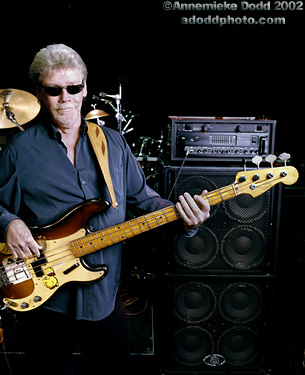|


In 1998, Donald "Duck" Dunn collaborated with Fender to produce a signature Precision
Bass, a candy apple red-colored model based on the late 1950s style, with a
gold anodized pickguard, a split-coil humbucking pickup and vintage
hardware.
As a member of Rock'n'Roll Hall Of Famers Booker T. & The MGs, Duck Dunn was
house bass player at the legendary Soul/R'n'B label, Stax, where his meaty
playing helped define one of the most distinctive and enduring sounds in
popular music. Among the timeless recordings Dunn held down the bottom end
of, are Respect, Dock Of The Bay and I've Been Loving You Too Long, by Otis
Redding, Wilson Pickett's In The Midnight Hour, and Hold On I'm Coming by
Sam and Dave, not to mention sessions with Neil Young, Eric Clapton and
Jerry Lee Lewis.
Born in Memphis in late November, 1941, Dunn was given his nickname by his
father as the two watched a Donald Duck cartoon on TV. "It was just one of
those things that stuck," he recalls. "Most of my school friends and even a
few of my teachers called me Duck."
Although a grandfather he never knew played fiddle, there was no music in
Duck's immediate family. "My father was a candy maker. Duck tried to
conform: "I worked for my dad in the candy factory for a while. I also had a
job with an electrical company repairing long range air raid sirens." In his
heart, though, Dunn always knew where his talents lay. I picked up a ukulele
when I was about 10 and I started playing bass when I was 16. I tried the
guitar but it had two strings too many. It was just too complicated, man!
Plus, I grew up with Steve Cropper. There were so many good guitar players
another one wasn't needed. What was needed was a bass. I mostly learned just
by listening to records. I don't know how to explain it but I knew if I
could do it, I'd be good at it! My first bass was a new Kay, one of the
cheaper models."
And, of course, it was slightly less than Duck wanted. Smiling at the
memory, he adds: "When I used to look in the music store windows and see the
Fenders hanging there, I was like a kid at Christmas. The Kay was fine but
you knew if you could get your hands on a Fender you would do better. I
bought my first Fender in '58 and I still have it at home. I lost it once
and I got it back," he pauses. "It's a Precision, with a maple neck. I just
always took it for granted, never worried about the setting or action. It
was a Fender, man, I didn't care!"
Influenced by blues and R&B stars like BB King and Ray Charles, Dunn and
Cropper formed their first band, The Royal Spades, in high school. Cropper
subsequently left the band to become a full-time session musician at the
Stax studio. He urged Dunn to follow him and the two became part of Booker
T's MGs, which in turn become the house band at Stax.
"I would have liked to have been on the road more but the record company
wanted us in the studio. Man, we were recording almost a hit a day for a
while there. But I never knew how popular that music was until I came to
England with Otis Redding in 1967." He adds with a chuckle: "I think most of
the English people thought I was a pick-up bass player. Without being racist
they probably thought that being affiliated with that music, Donald 'Duck'
Dunn was black!"
Like many recognisable sounds from Sun to Motown, the Stax sound evolved by
happy accident from a blend of musicians who worked well together. "Everyone
contributed," remembers Duck. "Sometimes, if I couldn't find something to
play maybe Booker found the bass line. Or maybe Steve Cropper. It was a real
family-orientated company. No one had any particular ego. We were a
real team."
In many instances, plenty of song riffs and rhythms famously emerged from
spontaneous jam sessions on the play-out of the previous recording. "When we
came to the fade-outs, almost everyone would change their rhythm or the
notes they were playing. That was the fun part of it. When we got to the end
we all knew we could relax and do what we wanted to do."
In common with most musicians from that era, the people who created the Stax
sound came away with less money than they deserved. "I always look back and
say I should have made more," sighs Duck, slowly. "It should have been more
lucrative, but it wasn't. We were cheated a little bit. But with the music
and what I learned... it doesn't matter. I have no regrets."
Dunn's greatest pleasure, however, came from the music he created with the
MGs. Dunn joined the MGs when bassist Lewis Steinberg left the band after
having scored a million seller with the instrumental Green Onions in 1962.
The MGs continued to hit the charts well into the '70s. Among their biggest
successes were Hang 'Em High and Time Is Tight, both from movie soundtracks,
also Soul Limbo, a Caribbean-styled number later to become very familiar as
the cowbell-intro'd theme tune of the BBC's test cricket coverage.

|